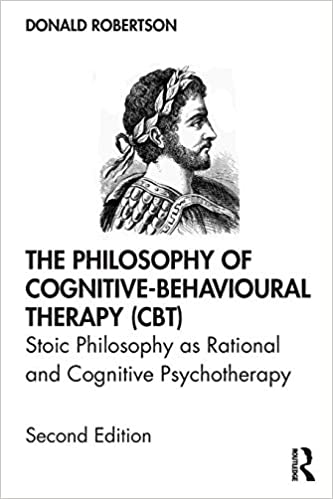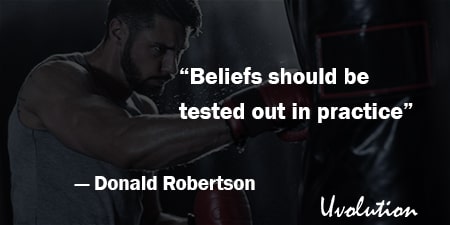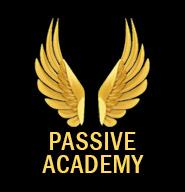The Philosophy of Cognitive Behavioural Therapy (CBT) by Donald Robertson
The Book in 1 Sentences
“However, there is an important sense in which psychotherapy, even as we know it today, can trace its roots much further back, perhaps all the way back into prehistory, before such ideas were committed to writing.
Modern psychotherapy, especially in the form of cognitive-behavioral therapy (CBT), the most ‘modern’ of our contemporary schools, can also be viewed as part of an ancient therapeutic
tradition derived from the informal philosophical circle surrounding Socrates (470-399 bc), and, therefore, stretching back to Athens in the fifth century bc.
Of the various schools of Socratic philosophy, the one that bears the strongest therapeutic orientation is undoubtedly Stoicism, especially that of the later Roman schools.
According to Galen, physician to the Stoic Emperor Marcus Aurelius, Chrysippus, one of the founders of Stoicism, emphasized the role of philosophers as that of ‘physician of the soul,’ someone whom we would now refer to as psychotherapist.” ~ Donald Robertson
5 BIG Ideas
The Philosophy of Cognitive Behavioural Therapy Book Summary
1. LIVE the Ideas
“Recent decades have seen growing interest in movement called ‘philosophical practice’ and
other attempts to promote philosophy outside of the academic institutions as something that
‘ordinary people’ do in cafes, or apply to their own life problems in the form of individual counselling or group sessions with a quasi-therapeutic style.
Even many academic philosophers appear to crave, quite understandably, a return to the days when philosophical discourse was meant to be rooted in corresponding behavioral and emotional transformation and not merely an ‘academic’ pursuit abstracted from any practical application.
The ancients conceived of the ideal philosopher as a veritable warrior of the mind, a spiritual hero akin to Hercules himself, but since the demise of the Hellenistic schools, the philosopher has become something more bookish, not a warrior, but a mere librarian of the mind.”
Ryan Holiday - in his book The Daily Stoic- says: “The Stoics loved to use boxing and wrestling metaphors the way we use baseball and football analogies today. This is probably because the sport of pankration—literally, ‘all strength,’ but a purer form of mixed martial arts than one sees today in the UFC—was integral to boyhood and manhood in Greece and Rome.
The Stoics refer to fighting because it’s what they knew. Seneca writes that unbruised prosperity is weak and easy to defeat in the ring, but a ‘man who has been at constant feud with misfortunes acquires a skin calloused by suffering.’ This man, he says, fights all the way to the ground and never gives up.
That’s what Epictetus means too. What kind of boxer are you if you leave because you get hit? That’s the nature of the sport! Is that going to stop you from continuing?”
“Marcus Aurelius speaks of the Stoic philosopher training himself to become, ‘an athlete in the greatest of all contests—the struggle not to be overwhelmed by anything that happens.’”
2. What do both CBT and Stoicism tell us?
“Cognitive-behavioral therapy (CBT) is the predominant school of modern evidence-based
psychological therapy. As the name implies, it employs both cognitive and behavioral
interventions.
Unfortunately, this name belies the fact that CBT is concerned with helping clients to deal with irrational or disturbing emotions, and to cultivate rational, healthy, and proportionate ones in their stead.
The terms ‘cognitive’ and ‘rational’ also suggest to some people’s minds that CBT must be a form of rationalization, or that it neglects emotion, intuition, or practical experience.
However, in this sense of the word, CBT is probably anti-rationalist, in its emphasis upon the value of behavioral experiments and empirical observation.
In other words, CBT emphasizes that, in so far as it is reasonable to do so, beliefs should be tested out in practice, in the laboratory of our personal experience.”
Our feelings follow our thoughts and behaviors. Donald says that:
1. “Cognitive activity affects behavior.
2. Cognitive activity may be monitored and altered.
3. Desired behavior change may be affected through cognitive change.”
Epictetus says “Of things some are in our power, and others are not.” and “It is not the things
themselves that disturb people but their judgments about those things.”
“If our emotions are not ultimately determined by external events alone but by our own beliefs and value judgments, then the habit of making healthy and rational judgments is more valuable to us than anything else.”
“If guilt serves a purpose, it is surely to motivate us to change today, in order to prepare for tomorrow, but not to condemn ourselves to endless complaining about yesterday.”
3. Your purpose in life..
"The ideal state of the human mind is not irrational indulgence in mere sensory pleasure
(hedonism), therefore, but something known as eudaimonia, a Greek term that encompasses
rational fulfilment, happiness, and well-being.
If ‘daemon’ were taken simply to mean mind, the word eudaimonia could be literally translated as meaning ‘mental health,’ although this does fail to do justice to the metaphysical connotations of the Greek word, which can also be taken to mean being on good terms with one’s inner daemon or guide, a concept not unlike the Christian idea of conscience.
In any case, the cardinal virtue or quality (areté) that contributes to eudaimonia is simply wisdom (sophia), or, if you prefer, it could be translated as meaning philosophical ‘enlightenment.’
Knowing this leads us to value and pursue the cultivation of human wisdom above all else, which is illustrated in the very word ‘philosophy,’ the love of wisdom.
Philosophy in this concrete sense, the everyday pursuit of wisdom, is, therefore, defined as the art of living, the highest human purpose, though different schools of ancient philosophy differed on their interpretation of specifically how this was to be put into practice.
It should be evident that for Socrates and the Stoics, the notion that the goal of human life is the pursuit of wisdom does not equate to saying that the ‘meaning of life’ is that one should spend it reading books on philosophy, but, rather, that one should strive for practical wisdom in facing everyday challenges.”
4. Focus on PROCESS not results
“Seneca defines the reserve clause by the following formula, ‘I want to do such and such, as long as nothing happens which may present an obstacle to my decision.” He gives the example, ‘I will sail across the ocean, if nothing prevents me,’ and elaborates, Nothing happens to the Sage contrary to his expectations, for he foresees that something may intervene which prevents that which he has planned from being carried out. ...
What he thinks above all is that something can always oppose his plans. But the pain caused by failure must be lighter for one who has not promised success to himself beforehand.
The Stoic, therefore, makes a point of qualifying the expression of every intention by introducing a distinction between his will and external factors beyond his control. The sage, thereby, holds two complementary propositions in mind simultaneously, viz.,
1. I will do my very best to succeed ...
2. while simultaneously accepting that the ultimate outcome is beyond my direct control.
It implies, ‘I will try to succeed, but am prepared to accept both success and failure with
equanimity,’ and, thereby recognizes human fallibility. Centuries later, Christian theologians
would signify the same notion by appending letters ‘DV,’ or Deo Volente (‘God Willing’) to their correspondence.”
“Cicero uses this analogy of the archer shooting an arrow at a target. His ultimate wish is to hit the target, but he can only do everything within his power to shoot his arrow straight, and so shooting straight, as opposed to actually hitting the target, must be his primary concern, and so it is with life in general.
Nowadays we say, ‘All that anyone can ask is that you try your best.’ Marcus Aurelius writes, ‘Thanks to action ‘with a reserve clause’... there can be no obstacle to my intention.”
5. Keep the highest version of yourself in mind
“‘Begin with the end in mind,’ is one of the 7 Habits recommended in recent decades by the
bestselling self-help author Stephen Covey. It is not a trivial matter to observe that, unlike
Stoicism and most classical philosophies, CBT lacks any clear account of the ideal toward which it aims. ...
By contrast, one of the most fundamental techniques of ancient philosophical therapy
appears to have been the public discussion and private contemplation and visualization of the
sage and his virtues, the imaginary embodiment, ideal role model, and ultimately ‘end,’ or goal,
of philosophical practice.”
“Underlying this conviction is the parallelism between physical and spiritual exercises: just as, by dint of repeated physical exercises, athletes given new form and strength to their bodies, so the philosopher develops his strength of soul, modifies his inner climate, transforms
his vision of the world, and, finally, his entire being.”
That was my QUICK summary of the great book The Philosophy of Cognitive Behavioural Therapy ( CBT) by Donald Robertson. If you’re interested, get your copy. There is a HUGE amount of life-changing ideas in this book, and we’ve only touched on a tiny bit of it.
Buy The Book: The Philosophy of Cognitive Behavioural Therapy ( CBT) by Donald Robertson

GET Blinkist 7 Days FREE Trial
3000+ Book Summaries
(Audio and Text)








